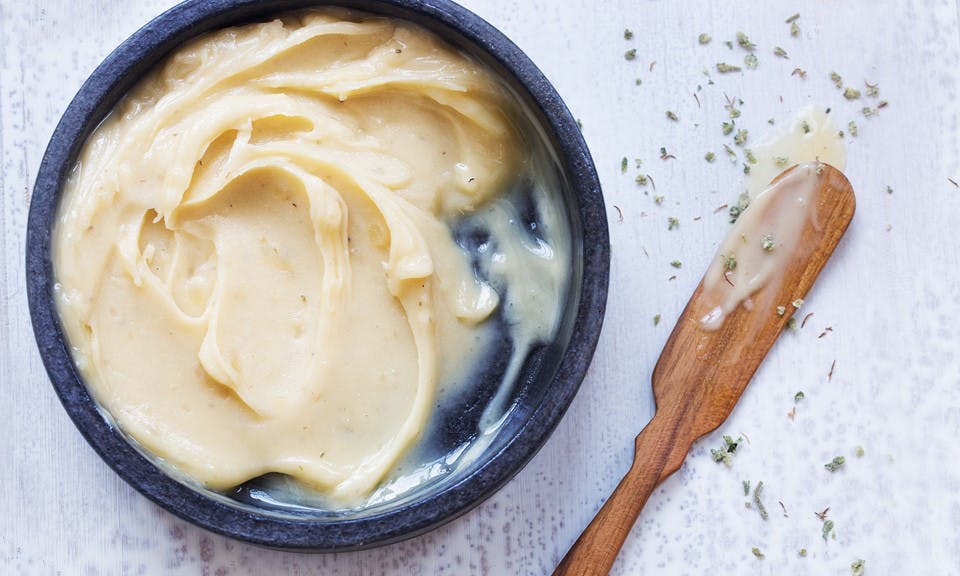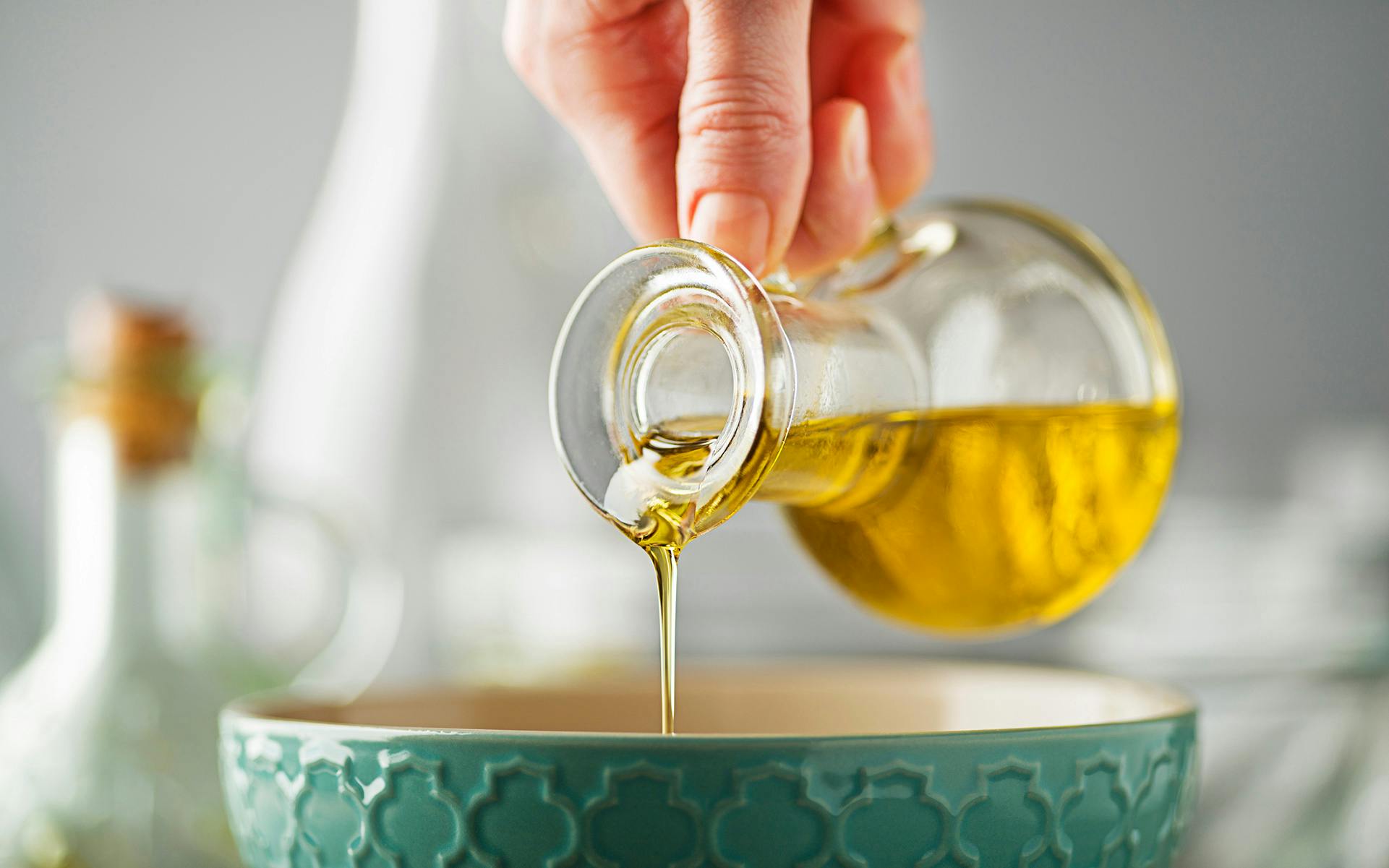Why is coconut oil popular for cannabis infusion?
Cannabis compounds like cannabinoids are lipid soluble, and bind to fats. Coconut oil has a high concentration of fatty acids, or saturated fats, which are great for cannabinoids to bind to.
Compared to olive oil, which usually contains a saturated fat content of less than 20%, or butter, with about 60% saturated fats, coconut oil usually contains over 80% saturated fats. This means coconut oil can retain more cannabinoids during infusion, making it more potent.
Coconut oil also has a higher smoke point, so it can be heated at a higher temperature with less of a chance of burning it.
Weed butter vs. coconut oil: Is coconut oil or butter better for edibles?
Many commercial baked good edibles use either infused butter or coconut oil. Which is best is a matter of preference and dietary needs. Coconut oil’s high fat content means it can absorb a higher concentration of cannabinoids. It’s also vegan for consumers who choose to abstain from animal products or have lactose intolerance.
Butter, on the other hand, has a better flavor and feel when incorporated in a baked good. It also suits those with tree nut allergies.
Coconut oil uses and health benefits
Coconut oil has an abundance of heathy fatty acids, making it ideal for people looking for a healthier cannabis oil base than butter, canola, or olive oil.
Coconut oil also remains solid at room temperature, making it easy to store and also a great medium for a topical.
Shop highly rated dispensaries near you
Showing you dispensaries nearIts solid state makes it easy to work with and dose into gelatin capsules to make cannabis pills and dose accurately for oral consumption.
Choosing the right coconut oil for your weed infusion
Coconut oils for sale in health food stores and online fall into one of two broad categories: refined and unrefined (virgin). By virtue of its minimal processing, unrefined coconut oil maintains the fresh, tropical aroma and flavor of the coconut, as well as the fruit’s antioxidants. This makes it ideal for use in topical recipes and if the flavor isn’t an issue.
Refined coconut oil, on the other hand, has often been through deodorizing and bleaching processes that result in a milder flavor and higher smoking point, making it better suited to baking and infusions.
MCT oil made from coconut oil contains the same healthy fats as regular coconut oil, but the molecules are smaller, and thus easier to digest.
All of these options will suit all the recipes listed throughout this guide, depending on your preferences.
How to make cannabis-infused coconut oil

Materials
- Baking sheet
- Parchment paper
- Oven
- Saucepan, stock pot, double-boiler, or slow cooker
- Mesh strainer or cheesecloth
- Container for cannabis oil
- Cannabis grinder (optional)
Ingredients
- 1 cup ground cannabis flower (7-10 grams)
- 1 cup coconut oil
When making cannabis coconut oil, we recommend a 1:1 ratio of cannabis to oil. If you want milder effects, use less cannabis.
Directions
- Decarb the cannabis.Decarboxylation activates cannabis by turning THCA in the plant into THC, the psychoactive compound that will get you high. Loosely break up cannabis and place it on parchment paper on a baking sheet. Heat it for 30-40 minutes in an oven at 245ºF.
- Grind or break down cannabis. A grinder will break your weed up into an even consistency, but you can just as easily use your hands too. Keep in mind that anything small enough to fit through a strainer will end up in your finished product, so don’t grind your cannabis into a fine powder.
- Heat oil and decarbed cannabis. Add oil and decarbed cannabis to double-boiler, slow cooker, or saucepan, and simmer on low for 2-3 hours. Make sure the temperature of the oil stays between 160-200ºF.
- Strain and store the oil.Put mesh strainer or cheesecloth over container for oil and pour the oil/cannabis mixture through it. Do not squeeze it out—this will add more chlorophyll to your oil and make it taste more vegetal. Discard the plant material. The oil will have a shelf life of at least two months and can be extended with refrigeration.
Can I infuse RSO, shatter, or distillate into coconut oil?
Yes! As long as the concentrate is oil-based and contains lipids, coconut oil will bind to it. Our recipe for infusing coconut oil with cannabis can be used here as well, with a few tweaks.
Keep in mind that many of these extracts and concentrates may have different decarboxylation temperatures than flower due to their lack/varying degrees of plant material. And because they contain a much higher concentration of cannabinoids, especially THC, that you will need to monitor your dosage more closely to ensure you don’t get too high for your personal limits.
How to use cannabis coconut oil
People mainly add cannabis coconut oil to food when cooking to infuse dishes with cannabis. We recommend trying a little bit at first to determine its potency before adding a lot to a dish.
You can also add it to a hot beverage, as it will melt into its liquid form, but it may create an oily mouth feel.
Edible recipes with coconut oil
Infused coconut oil makes for a great replacement for weed butter in edible recipes. In fact, it can also be used in tandem with weed butter. Here are some of our favorite recipes that can be made with coconut oil.
Other ways to use cannabis-infused coconut or MCT oil
Cannabis coconut oil is also great as a topical for local pain relief. Just rub some on your skin as you would a salve or cream; consider adding a dollop to your regular body and facial moisturizers for additional smoothing and antioxidants.
Infused coconut oil can also be used as a sensual lubricant in the bedroom, but be safe! Coconut oil may weaken condoms, as oil and latex do not mix.
Infused coconut oil also works well in discrete capsules and suppositories.
Ever heard of oil pulling? Swishing some coconut oil during your regular teeth brushing can help clear pesky bacteria from your teeth and gums, with some anti-inflammatory benefits to boot.
Patrick Bennet, Pat Goggins, and Amelia Williams contributed to this article.
Read more of Leafly’s guide to cannabis edibles
By providing us with your email address, you agree to Leafly's Terms of Service and Privacy Policy.







